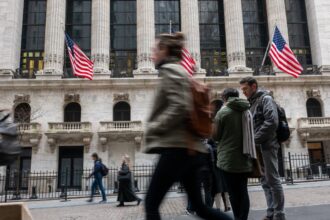Consumers hit with credit card late fees could get some relief if a law proposed by the Biden administration, capping these penalties at $8, is put into action.
The move to lessen the fees could save millions of Americans as much as $9 billion a year, the White House said in a press release.
Late credit card payments can cause consumers to experience a host of repercussions, such as a ding on their credit score, and on top of that, they also face paying credit card companies fees of as much as $41 for each missed payment.
The new law, which would be enforced by the Consumer Financial Protection Bureau (CFPB), would additionally cap late fees to 25% of the required payment and end the automatic inflation adjustment for these fees.
“By our estimates, 75% of late fees have no purpose beyond padding the credit card companies’ profits,” CFPB director Rohit Chopra said in a statement. “They’re a reflection of the asymmetry of power that punishes and penalizes consumers when they make mistakes, while credit card companies are often allowed to fine print themselves out of trouble.
“This isn’t a sign of fair competition,” Chopra continued.
If you are struggling to pay off debt, you could consider using a personal loan to consolidate your payments at a lower interest rate, saving you money each month. You can visit Credible to find your personalized interest rate without affecting your credit score.
HIGH PRICES AND INTEREST RATES WILL KEEP DRIVERS FROM BUYING CARS IN 2023: SURVEY
Card companies can still charge late fees
Congress initially banned exorbitant late fees in 2009. However, the Federal Reserve Board (FRB), the body responsible for putting the law into action, added an immunity provision that created a regulatory loophole that companies used to avoid scrutiny for charging these late fees, according to the CFPB.
Credit card companies charged roughly $12 billion in late fees in 2020, totaling more than 10% of all credit card interest and fees charged to consumers, according to CFPB estimates.
“The Federal Reserve Board, by regulation, created the immunity provisions to allow credit card companies to avoid scrutiny of whether their late fees met the reasonable and proportional standard,” the CFPB said in a statement. “Over time, those provisions have risen with inflation to $30 for an initial late payment and $41 for subsequent late payments.”
Credit card companies will still be able to charge late fees, but under the new provision, they would be required to prove that their fees align with their collection costs.
The move is part of the Biden administration’s broader initiative to eliminate hidden junk fees that can cost U.S. consumers hundreds of dollars each month.
If you have high-interest debt, a personal loan could help you pay it off at a lower rate. You can check out the Credible marketplace to compare multiple personal loan lenders at once and find the right option for you.
JOB GROWTH SURGES IN JANUARY, REVERSING SLOWDOWN TREND OF PAST MONTHS
Law could be in effect as soon as next year
The new late fee regulation could go into effect as soon as 2024. It could have a considerable impact on the average credit card holder, according to Shumel Shayowitz, Approved Funding president and chief lending officer.
“With credit card debt surging over the past year, this would be a welcomed relief for most,” Shayowitz said.
Not everyone agrees. The American Bankers Association (ABA) labeled the CFPB action as “extreme” and said that could force credit card companies to look at other avenues to compensate for the lost penalty fees.
“If the proposal is enacted, credit card issuers will be forced to adjust to the new risks by reducing credit lines, tightening standards for new accounts and raising APRs for all consumers, including the millions who pay on time,” Rob Nichols, ABA president and CEO, said.
“…Any reduction in the late fee safe harbor would have a significant adverse impact on a substantial number of community banks and credit unions with assets below $850 million, many of which would be forced to exit the credit card market altogether,” Nichols continued. “That will only reduce competition and access to credit.”
One way to reduce your monthly expenses is to pay off high-interest debt. You could consider using a personal loan to help you do so at a lower interest rate, saving you money each month. You can visit Credible to compare multiple lenders at once and choose the one that’s the best option for you.
MORTGAGE RATES KEEP DROPPING, MAKING HOUSING AFFORDABLE FOR MILLIONS MORE: FREDDIE MAC
Have a finance-related question, but don’t know who to ask? Email The Credible Money Expert at [email protected] and your question might be answered by Credible in our Money Expert column.
Read the full article here










